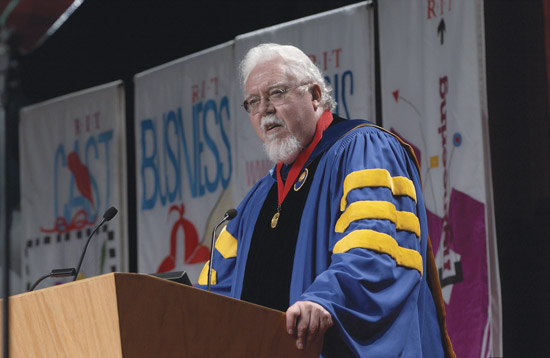Shakespeare and students
Provost Stan McKenzie follows his heart back to the classroom
In honor of his 41 years of service to RIT, retiring Provost Stanley McKenzie was chosen to give the keynote address at 2008 Convocation.
Stan McKenzie tried to step down from the position of provost four years ago. But when President Albert Simone announced his intention to retire, McKenzie agreed to stay on until a new president was settled in.
That’s been accomplished: RIT’s ninth president, Bill Destler, has been on the job since July 2007. Now the man who has been RIT’s top academic officer since 1994 is more than ready to return to his roots.
“I love classroom teaching, particularly teaching literature to tech students,” says McKenzie. “To turn them on to Shakespeare – there’s nothing better than that.”
That’s exactly what happened to him. McKenzie was a math and physics major at MIT when, in his senior year, an exceptional professor ignited a passion for Shakespeare. He went on to the University of Rochester for M.A. and Ph.D. degrees in English literature and started teaching at RIT in 1967.
His involvement with students soon extended beyond the classroom. He counts his 16 years dealing with matters of student misconduct as director of Judicial Affairs as among his most satisfying assignments. “My main role was helping them get back on track, “ he says. “No student ever comes to RIT to get thrown out.”
RIT has marked momentous changes since he arrived. The current campus opened in 1968 – the same year that National Technical Institute for the Deaf welcomed its first students. Enrollment has grown from fewer than 10,000 students to nearly 16,000. More than 100 academic programs, including four Ph.D. degrees (plus two more under development), have been launched. Computers have evolved from room-sized and exiguous to portable, powerful and ubiquitous.
“In the computer age, students are more aware of what’s happening,” says McKenzie. They may lack the kind of general knowledge expected of their predecessors, but today’s students know how to access information instantly, he says.
Overall, he notes, the caliber of students has risen over the past four decades. “We’re continually attracting better students,” says McKenzie. The student body has become more diverse, with more international students and more women, deaf and hard-of-hearing and ethnic groups represented.
However, too many students leave RIT without completing their studies. A major challenge faced by RIT’s faculty is to understand that students have different styles of learning, says McKenzie. “It is our responsibility to teach students in the way they learn best,” says the provost.
McKenzie says the biggest surprise in his career came in 1987, when then-Provost Thomas Plough called asking him to become acting dean of the College of Liberal Arts.
“It was absolutely unexpected,” he recalls. “I was not even a candidate.” Once on the job, he decided to become a candidate. But after serving as acting dean for a year, he was not offered the permanent appointment.
“In retrospect,” he says, “it was the best thing that ever happened.” Close on the heels of this personal disappointment came the tragic death of a good friend. “That put not getting the deanship into perspective,” says McKenzie.
McKenzie, known for his eclectic interests and upbeat attitude, says a sense of perspective has been a tremendous asset in his role as provost. Another important qualification was his deep knowledge of RIT – “I knew all the players.”
That deep institutional knowledge and work ethic as well as his good spirits have earned the respect of colleagues.
“It is difficult to capture the true essence of Stan McKenzie in a few words,” says Kristen Waterstram-Rich, current chair of Academic Senate and director of Premedical Studies. “He arrived in his current position as a peace-maker during a tumultuous time at RIT. In his position as provost and chief academic officer, we have appreciated Stan’s openness, his willingness to listen, and his ability to clearly explain complex issues and the rationale behind decisions. His knowledge of the workings of the university as a whole is impressive. And his collaborative spirit, fair-mindedness and ethical nature have made him a trusted adviser and advocate for students and faculty for many years. He will be missed.”
But he'll be a presence on campus for a while longer. McKenzie plans to teach in the fall 2008 quarter, begin a long-overdue sabbatical at the home he built in Tucson, Ariz., during winter and spring quarters, teach again in fall 2009, complete his sabbatical during winter 2009-2010, and then move into retirement transition.
McKenzie has been thinking about his next project for many years: a book focusing on Shakespeare and the concept of nothingness. “Shakespeare is very conscious that dramatic art is unsubstantial – creation out of nothing.”
There’s no doubt that McKenzie will be able to create something out of that premise.














